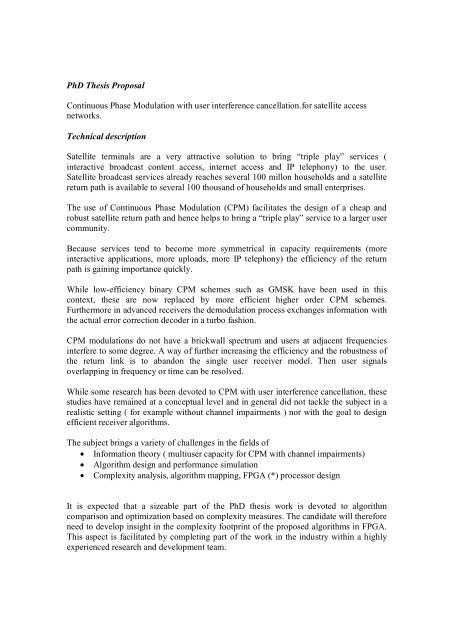PhD Thesis Proposal Continuous Phase Modulation with user ...
PhD Thesis Proposal Continuous Phase Modulation with user ... PhD Thesis Proposal Continuous Phase Modulation with user ...
PhD Thesis Proposal Continuous Phase Modulation with user interference cancellation.for satellite access networks. Technical description Satellite terminals are a very attractive solution to bring “triple play” services ( interactive broadcast content access, internet access and IP telephony) to the user. Satellite broadcast services already reaches several 100 millon households and a satellite return path is available to several 100 thousand of households and small enterprises. The use of Continuous Phase Modulation (CPM) facilitates the design of a cheap and robust satellite return path and hence helps to bring a “triple play” service to a larger user community. Because services tend to become more symmetrical in capacity requirements (more interactive applications, more uploads, more IP telephony) the efficiency of the return path is gaining importance quickly. While low-efficiency binary CPM schemes such as GMSK have been used in this context, these are now replaced by more efficient higher order CPM schemes. Furthermore in advanced receivers the demodulation process exchanges information with the actual error correction decoder in a turbo fashion. CPM modulations do not have a brickwall spectrum and users at adjacent frequencies interfere to some degree. A way of further increasing the efficiency and the robustness of the return link is to abandon the single user receiver model. Then user signals overlapping in frequency or time can be resolved. While some research has been devoted to CPM with user interference cancellation, these studies have remained at a conceptual level and in general did not tackle the subject in a realistic setting ( for example without channel impairments ) nor with the goal to design efficient receiver algorithms. The subject brings a variety of challenges in the fields of Information theory ( multiuser capacity for CPM with channel impairments) Algorithm design and performance simulation Complexity analysis, algorithm mapping, FPGA (*) processor design It is expected that a sizeable part of the PhD thesis work is devoted to algorithm comparison and optimization based on complexity measures. The candidate will therefore need to develop insight in the complexity footprint of the proposed algorithms in FPGA. This aspect is facilitated by completing part of the work in the industry within a highly experienced research and development team.
<strong>PhD</strong> <strong>Thesis</strong> <strong>Proposal</strong><br />
<strong>Continuous</strong> <strong>Phase</strong> <strong>Modulation</strong> <strong>with</strong> <strong>user</strong> interference cancellation.for satellite access<br />
networks.<br />
Technical description<br />
Satellite terminals are a very attractive solution to bring “triple play” services (<br />
interactive broadcast content access, internet access and IP telephony) to the <strong>user</strong>.<br />
Satellite broadcast services already reaches several 100 millon households and a satellite<br />
return path is available to several 100 thousand of households and small enterprises.<br />
The use of <strong>Continuous</strong> <strong>Phase</strong> <strong>Modulation</strong> (CPM) facilitates the design of a cheap and<br />
robust satellite return path and hence helps to bring a “triple play” service to a larger <strong>user</strong><br />
community.<br />
Because services tend to become more symmetrical in capacity requirements (more<br />
interactive applications, more uploads, more IP telephony) the efficiency of the return<br />
path is gaining importance quickly.<br />
While low-efficiency binary CPM schemes such as GMSK have been used in this<br />
context, these are now replaced by more efficient higher order CPM schemes.<br />
Furthermore in advanced receivers the demodulation process exchanges information <strong>with</strong><br />
the actual error correction decoder in a turbo fashion.<br />
CPM modulations do not have a brickwall spectrum and <strong>user</strong>s at adjacent frequencies<br />
interfere to some degree. A way of further increasing the efficiency and the robustness of<br />
the return link is to abandon the single <strong>user</strong> receiver model. Then <strong>user</strong> signals<br />
overlapping in frequency or time can be resolved.<br />
While some research has been devoted to CPM <strong>with</strong> <strong>user</strong> interference cancellation, these<br />
studies have remained at a conceptual level and in general did not tackle the subject in a<br />
realistic setting ( for example <strong>with</strong>out channel impairments ) nor <strong>with</strong> the goal to design<br />
efficient receiver algorithms.<br />
The subject brings a variety of challenges in the fields of<br />
Information theory ( multi<strong>user</strong> capacity for CPM <strong>with</strong> channel impairments)<br />
Algorithm design and performance simulation<br />
Complexity analysis, algorithm mapping, FPGA (*) processor design<br />
It is expected that a sizeable part of the <strong>PhD</strong> thesis work is devoted to algorithm<br />
comparison and optimization based on complexity measures. The candidate will therefore<br />
need to develop insight in the complexity footprint of the proposed algorithms in FPGA.<br />
This aspect is facilitated by completing part of the work in the industry <strong>with</strong>in a highly<br />
experienced research and development team.
(*) Field Programmable Gate Array : a configurable generic and highly parallel signal<br />
processing component<br />
Partners<br />
The <strong>PhD</strong> is proposed by Newtec, a leading satellite equipment manufacturer, through its<br />
R&D center in Brest, TurboConcept.<br />
The Academic partners are University of Parma (G. Colavolpe) and ENST Bretagne (A.<br />
Graell i Amat).<br />
This environment ensures to the candidate a high level and state-of-the art knowledge and<br />
skills covering both digital signal processing and implementation aspects.<br />
Duration / Location :<br />
- <strong>PhD</strong> duration 36 months<br />
- located partly in TurboConcept/ENST-Bretagne (Brest, France), partly in Parma, Italy<br />
Contact persons :<br />
Jacky Tousch, TurboConcept<br />
jacky.tousch@turboconcept.com<br />
Daniel Delaruelle, Newtec<br />
daniel.delaruelle@newtec.eu



